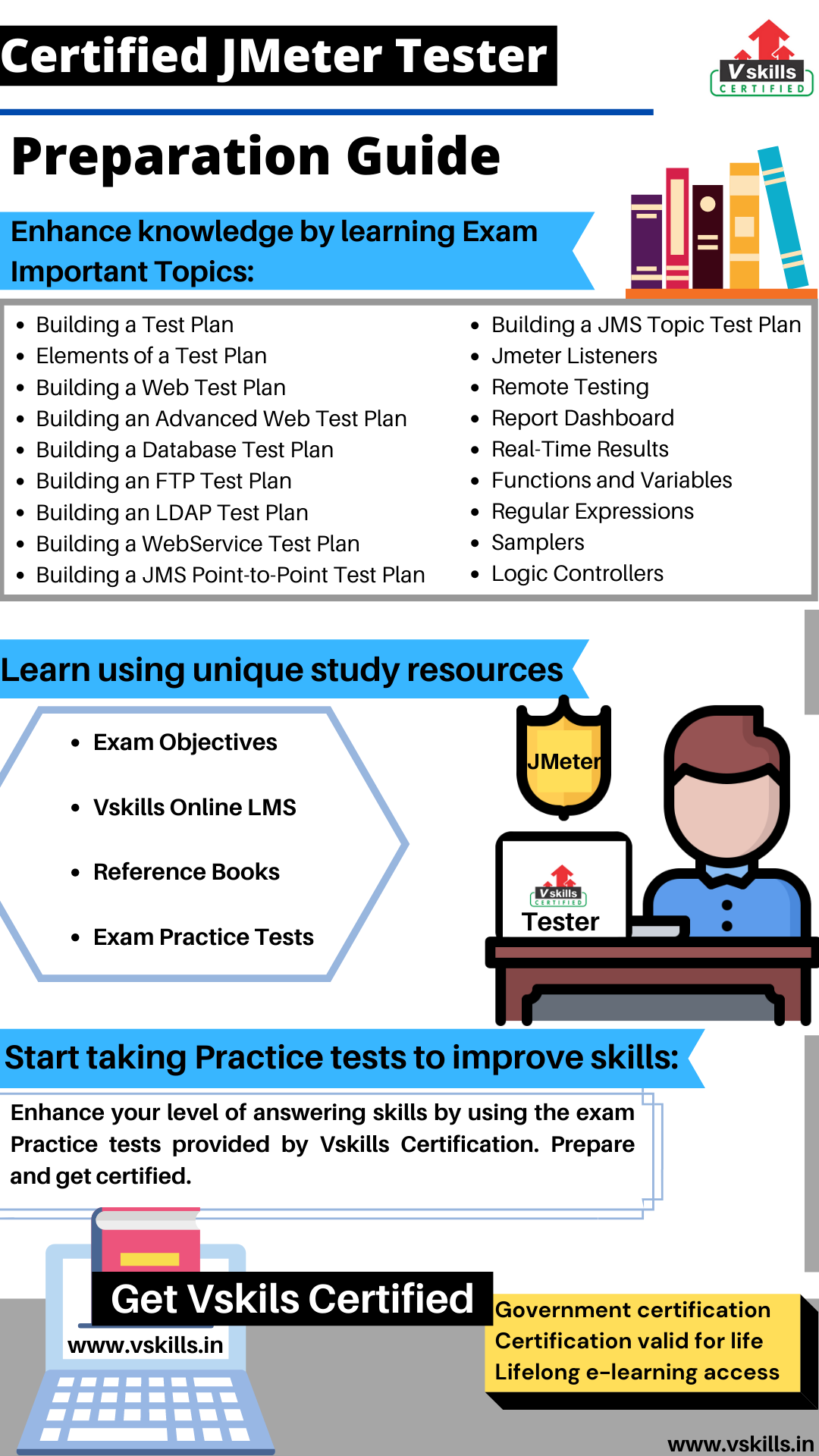Jmeter is one of the most demanded IT tools of the 21st century. It is one of the topmost performance testing tools in the market due to the protocol support, features, and useful extensions available for it. Additionally, it is very easy to learn and develop relevant skills about it. Learning Jmeter can help you learn skills to develop knowledge for Selenium, SOAP/REST, Databases JDBC, etc which are used to measure the complete performance of a Web Application. Also, there are many new features which you will learn in Jmeter. Jmeter certification and training are some of the most trending avenues to learn and grow in your career. Furthermore, it will give an edge over other applicants. So Let’s learn more about it.
What is Jmeter ?
JMeter is a testing tool used for analyzing and measuring the performance of different software services and products. Secondly, It is a pure Java open source software used for testing Web Application or FTP application. It is used to execute performance testing, load testing, and functional testing of web applications. Furthermore, simulates a group of users sending requests to a target server, and returns statistics that show the performance/functionality of the target server/application via tables, graphs, etc. Also, it is very widely used in the industry.
Apache JMeter may be used to test performance both on static and dynamic resources, Web dynamic applications. Furthermore, it can be used to simulate a heavy load on a server, group of servers, network or object to test its strength or to analyze overall performance under different load types.
Benefits of Becoming a Jmeter Expert
Since you are well aware about what JMeter is, let us look at some of the advantages and disadvantages of using JMeter The next question which must have arisen is. Why do you need JMeter to do the performance testing? This is because JMeter has features that other tools do not have.
Advantages of using JMeter
- Open Source: JMeter is an open source software. This means that it can be downloaded free of cost. It is also a 100% pure Java application. The developer can use its source code, can modify and customize it as per their requirement. They can also contribute their code to make a better JMeter.
- Ease of Use: The user can install and use JMeter easily. Just download it from internet, install and run. As a pure Java desktop application, it comes ready to use with default settings. It does not require you to have any specific skills or domain knowledge to use it.
- Platform independent: JMeter is developed in Java, which is the most popular programming language in the world. Therefore, it can run in any OS be it Window, Linux or Mac.
- Robust Reporting: JMeter can generate the effective reporting. The test result can be visualized by using Graph, Chart, and Tree View. JMeter supports different formats for reporting like text, XML, HTML and JSON.
- Ultimate Testing: With JMeter, user can do any kind of testing they want. Load Test, Stress Test, Functional Test, Distributed Test, all in one tool.
- Flexibility: You can customize JMeter as per your requirement and apply the automation testing to JMeter. You can save the effort of executing test cases manually.
Average Salary
Once you are exposed to the top recruiters that might hire you, the next curiosity in your head would be the pay scale of a JMeter Tester. In general, the average salary of a JMeter Tester is 485k per year and the salaries range from 310K – 998K depending upon the knowledge and expertise you bring to the table.

There are always heavy chances for an increase in salary with an increase in industry experience. Nonetheless, one should always remember that there is no shortcut to experience; one must keep oneself indulged in this field and work consistently to grab a lucrative career.
About Vskills Jmeter Certification
Firstly, performance is an important factor for any IT organisation. Moreover, poor performance causes massive damages to websites and software programs. Thus, It’s essential to improve and monitor the performance of an application on a regular basis. Also, it is an important part of software testing. Learning Jmeter enables you to design effective performance tests.
Since Jmeter Professionals are in great demand & Companies specializing in websites and web-based application testing are constantly hiring knowledgeable professionals. Various web development and software companies also need Jmeter professionals for performance testing projects. Therefore Jmeter Certifications is the way to move forward.
Why take this certification?
In Vskills Jmeter Certification, candidates will gain all the necessary skills and knowledge to become successful performance tester. Secondly, talking about the job market, Jmeter Professionals are in great demand and many companies specializing in websites and web-based application testing are constantly hiring knowledgeable professionals. Also, candidates in this certification will get to enhance their skills and master knowledge in the JMeter tool and process of performing extensive performance and load testing.
Course Outline
The course structure of Certified JMeter Tester is as follows:
Introduction
- Firstly, History
- Secondly, The Future
- Thirdly, Improvements
- Test plan building
- Requirements
- Optional
- Installation
- Running JMeter
- Configuring JMeter
Building a Test Plan
- Adding and Removing Elements
- Loading and Saving Elements
- Configuring Tree Elements
- Saving the Test Plan
- Running a Test Plan
- Stopping a Test
- Error reporting
Elements of a Test Plan
- Test Plan
- Thread Group
- Controllers
- Listeners
- Timers
- Assertions
- Configuration Elements
- Pre-Processor Elements
- Post-Processor Elements
- Execution order
- Scoping Rules
- Properties and Variables
- Using Variables to parameterise tests
Building a Web Test Plan
- Adding Users, Default HTTP Request Properties, Cookie Support and HTTP Requests, Listener to View Store the Test Results
- Logging in to a web-site
- Choose the same user or different users
Building an Advanced Web Test Plan
- Handling User Sessions With URL Rewriting
- Using a Header Manager
Building a Database Test Plan
- Adding Users, JDBC Requests and a Listener to View/Store the Test Results
Building an FTP Test Plan
- Adding Users, Default FTP Request Properties, FTP Requests and a Listener to View/Store the Test Results
Building an LDAP Test Plan
- Building an Extended LDAP Test Plan
- Adding Users, LDAP Extended Request Defaults, LDAP Requests and a Listener to View/Store the Test Results
Building a WebService Test Plan
- Creating WebService Test Plan
- Adding Users
- Adding a Listener to View Store the Test Results
- Rest Webservice
Building a JMS Point-to-Point Test Plan
- Adding a Thread Group and a Listener to View Store the Test Results
Building a JMS Topic Test Plan
- Adding Users and JMS Subscriber and Publisher
Jmeter Listeners
- Default Configuration
- CLI mode (batch) test runs
- Resource usage
- CSV Log format
- XML Log format 2.1
- XML Log format 2.2
- Sample Attributes
- Saving Response Data
- Loading (reading) response data
- Saving Listener GUI data
Remote Testing
- Setting up SSL
- Doing it Manually
- Tips
- Using a different port
- Using a different sample sender
- Dealing with nodes that failed starting
- Using a security-manager
Report Dashboard
- Overview
- Configuring Dashboard Generation
- Generating Reports
- Default graphs
- Generating customs graphs over time
Real-Time Results
- Metrics exposed
- JMeter configuration
- InfluxDB database configuration
- Grafana configuration
Best Practices
- Always use latest version of JMeter
- Use the correct Number of Threads
- Where to Put the Cookie Manager
- Where to Put the Authorization Manager
- Using the HTTP(S) Test Script Recorder
- User variables
- Reducing Resource Requirements
- BeanShell server
- BeanShell scripting
- Developing script functions in Groovy or Jexl3 etc.
- Parameterising tests
- JSR223 Elements
- Sharing variables between threads and thread groups
- Managing properties
- Deprecated elements
Load test application
- Questions to ask
- Resources
- What platform should I use to run the benchmarks/load-tests?
- Tools
- How can I enhance JMeter?
- Why Java?
Functions and Variables
- What can functions do
- Where can functions and variables be used?
- How to reference variables and functions
- The Function Helper Dialog
- Functions
- Pre-defined Variables
- Pre-defined Properties
Regular Expressions
- Overview
- Examples
- Line mode
- Meta characters
- Placement of modifiers
- Testing Regular Expressions
Samplers
- FTP Request
- HTTP Request
- JDBC Request
- LDAP Request
Logic Controllers
- Simple Controller
- Loop Controller
- Once Only Controller
- Interleave Controller
- Random Controller
- Random Order Controller
- Throughput Controller
- If Controller
- While Controller
- Switch Controller
- Switch Controller
- ForEach Controller
- Module Controller
- Include Controller
Hints and Tips
- Passing variables between threads
- Enabling Debug logging
- Searching
- JMeter with a HiDPI screen on Linux or Windows
- Autosave process configuration
- Adding Elements with Hotkeys
- Glossary
Preparatory Guide for Certified JMeter Tester
To help you in your preparation, we have a Jmeter study guide to which you can refer and prepare. Furthermore, following this preparation guide will help you learn and understand every exam’s objectives. Here we are providing you with the best learning resources to qualify for the exam. Moreover, here we are going to illustrate a detailed description to help you prepare for the exam. Let’s start with expert learning resources and a study guide.

Refer to Exam Objectives
It is important to know the topics beforehand. Significantly, this is the most important step in the preparation guide. Furthermore, exam objectives are very important when it comes to preparing the exam strategy. So, let’s take a quick look:
- Firstly, Building a Test Plan
- Secondly, Elements of a Test Plan
- Thirdly, Making a Web Test Plan
- Subsequently, Building an Advanced Web Test Plan
- Furthermore, Making a Database Test Plan
- Next, Building an FTP Test Plan
- Moreover, Making an LDAP Test Plan
- Building a WebService Test Plan
- Making a JMS Point-to-Point Test Plan
- Building a JMS Topic Test Plan
- Jmeter Listeners
- Remote Testing
- Report Dashboard
- Real-Time Results
- Functions and Variables
- Regular Expressions
- Samplers
- Logic Controllers
Join a Study Group
It is very important to interact with people who have a common aim in life. Joining study groups is a good way to get yourself fully involved with the certification exam you applied for. Furthermore, these groups will help you get up to date with the latest changes or any update happening exam. Also, these groups contain both beginners as well as professionals. Furthermore, these groups will help you get up to date with the latest changes or any update happening exam. Also, these groups contain both beginners as well as professionals. Moreover, This is a nice way for the students to discuss their issues.
E-Learning and Study Materials
Learning for the exam can be fun if you have the right set of resources matching your way of studying. Vskills offers you its E-Learning Study Material to supplement your learning experience and exam preparation. This online learning material is available for a lifetime and is updated regularly. You can also get the hardcopy for this material, so, you can prefer either way in which you are comfortable. Furthermore, you can refer, Vskills online tutorials as well.
Prepare with free Practice Test
The final step to success is to practice what you have learned. Moreover, taking a practice test is a great way to diversify your study strategy and ensure the best possible results for the real thing. Furthermore, analyzing the practice test is very important so as to ensure complete preparation. We provide you with free sample papers to help you excel in the examination.
It is very important to practice what you have learned so that you are in a position to analyze your practice. Furthermore, by practicing you will be able to improve your answering skills that will result in saving a lot of time. Moreover, the best way to start doing practice tests is after completing one full topic. It will work as a revision part for you. Furthermore, practicing you will be able to improve your answering skills that will result in saving a lot of time. Moreover, the best way to start doing practice tests is after completing one full topic as this will work as a revision part for you. Moreover, the best way to start doing practice tests is after completing one full topic. Furthermore, it will work as a revision part for you. Start practicing now!





